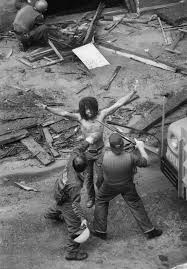I noticed an interesting hashtag on my timeline recently: #realizedIwasblack.
People were sharing their experiences growing up and when they were initially confronted with the realization that their perceptions of themselves ran counter to some other’s perceptions of them. CNN recognized that in “The Souls of Black Folk,” Du Bois shared his experience of when he realized that race mattered and that he’d be treated differently because he was Black. Many of those who posted shared some experience where they realized they were different based on their interactions with other members of society-often white people.
I tried to think of when I first realized I was Black and that people treated Black people differently. Last year, when we had a similar conversation during our school’s Cultural Context professional development, I failed at pinpointing the exact moment. As early as I can remember, I recognized myself as a Black person living in a white society. Here’s a few musings to share my own Black consciousness as a child.
Outside of National Geographic, Highlight, and Ranger Rick magazines, I don’t remember seeing a lot of reading materials that didn’t have positive Black people as the main characters. My brother and I shared a bedroom and a library. There were dozens of books and comic books, not DC and Marvel comics (I had to go to my cousins’ homes to read those), but the folks my mother would say, “These are your heroes.” Comics depicting the brilliance of Tubman and Douglass, and Black scientists like Latimer, Drew, McCoy, and Garrett Morgan. I #realizedIwasblack by the literature my family surrounded me with.
I #realizedIwasblack when I would read stories about our people’s struggles and triumphs. When I heard the legacy of resistance in my family’s personal stories. When I heard of mind-bending feats of survival and resistance by people who looked like me.
I #realizedIwasblack when I would hear the stories of my paternal grandmother’s participation in the Great Migration, chased by the KKK, who was looking for her uncle and assaulted her father instead. Her father had relatives in Philly and NY. They told them to leave Batesburg, SC. They did.
I #realizedIwasblack attending weekly literacy programming as a four-year-old in my paternal cousin’s house, a “former” Panther. We’d learn phonics, phonemic awareness, and Black pride-a weekly variation of Freedom School.
I #realizediwasblack when as a student at Nidhamu Sasa, my classmates and I sat at the feet of Angela Davis, Sonia Sanchez, and other Freedom Fighters and knew we had a linked history.
I #realizediwasblack when the literature my teachers used to teach us served as a mirror to my life and a chart for my future.
I #realizediwasblack when our school’s Freedom Choir (I was a very proud member) sang songs like,
I went to a meeting one night
And my feeling just wasn’t right
You see I thought that stuff about Blackness just wasn’t for me
But, when I found out it was for me
I joined in the unity
And now I’m down for the struggle for liberation
And
We are soldiers in the army
We gotta fight although we gonna cry
We gotta hold up the blood stained banner
We gotta hold it up until we die
I #realizediwasblack when our teachers told us and showed us that we were loved and that we mattered.
I #realizediwasblack when our teachers informed us that our schoolmate’s father (Mumia Abu-Jamal) was arrested.
I #realizediwasblack when we had to move through a sea of white cops and flashing red and blue lights to get to meetings to support the MOVE members.
I #realizediwasblack when, eating dinner with our family, watching the news on our small tv and I saw a shirtless Black man with his hands raised and assaulted. When I saw him handcuffed and kicked in the face multiple times by those who swear to protect and serve our communities, I #realizediwasblack. It is one of the images from my childhood that is seared in my memory.
. 
During lunch at Tabataba’i Middle School in Qom, an Iranian classmate told me that the police had dropped a bomb on a house in west Philly, I didn’t believe him. I thought it was Iranian propaganda. When I got home and my mother relayed the same story with more details, and we watched it on the news that afternoon, I #realizediwasblack.
I recall wondering how many more neighborhoods would be bombed before we returned to Philly.
I don’t remember when I initially knew I was Black, it feels as though I always did. My teachers, especially my first teachers (my parents), ensured that I was raised with a healthy dose of positive racial identity. They taught me who I was, what I was, and, even more importantly, what I was not.


[…] My career was launched close to the site of the bombing and I was already very familiar with the police’s hatred towards MOVE because I saw some of the police’s terrorism as a seven year old while watching television at my kitchen table. […]
i first knew i was black was when i asked moma why grandpa was black she explained i was whiter because back when white folks were in our ancestors
[…] learn race at an early age; there is no doubt that Black children understand what their Blackness means within our society. Maybe a good education for Black children can’t be found in most white institutional […]
[…] you have Black students, ask them to share their #realizedIwasblack and #BlackAt…stories. If what they tell each other is full of negativity and adversity, then […]
[…] racially motivated microaggressions, denying them the racial reality of what it means to be Black in America, or centering their own white-privileged comfort above that of our children’s’ best […]